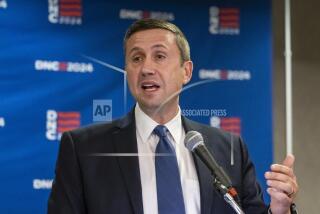Democratic Rallies
- Share via
The 42 Democratic conventions before this year’s meeting in Los Angeles have ranged from the routine--President Woodrow Wilson was nominated for a second term in 1916 on a 1,092-to-1 vote--to the explosive, as when the “Dixiecrats” bolted from the party in 1948. The first Democratic convention took place in 1832, a year after the first national nominating convention in U.S. history was held by the Anti-Masonic Party in 1831.
1832
Baltimore
Andrew Jackson *
*
1836
Baltimore
Martin Van Buren *
*
1840
Baltimore
Martin Van Buren
*
1844
Baltimore
James Polk *
*
1848
Baltimore
Lewis Cass
Convention votes to establish a continuing committee, known as “Democratic National Committee.”
*
1852
Baltimore
Franklin Pierce *
*
1856
Cincinnati
James Buchanan *
*
1860
Charleston, S.C., and Baltimore
Stephen Douglas
The convention deadlocks over wording of the slavery plank, with several dozen Southern delegates stomping out of the hall in Charleston. Delegates later reconvene in Baltimore to finish work.
*
1864
Chicago
George B. McClellan
*
1868
New York
Horatio Seymour
Susan B. Anthony urges support of women’s suffrage.
*
1872
Baltimore
Horace Greeley
*
1876
St. Louis
Samuel Tilden
*
1880
Cincinnati
Winfield S. Hancock
*
1884
Chicago
Grover Cleveland *
Cleveland becomes the first Democrat to take the White House in 28 years.
*
1888
St. Louis
Grover Cleveland
*
1892
Chicago
Grover Cleveland *
*
1896
Chicago
William Jennings Bryan
*
1900
Kansas City, Mo.
William Jennings Bryan
For the first time, each party had one woman delegate.
*
1904
St. Louis
Alton B. Parker
*
1908
Denver
William Jennings Bryan
*
1912
Baltimore
Woodrow Wilson *
*
1916
St. Louis
Woodrow Wilson *
*
1920
San Francisco
James M. Cox
The first Democratic convention held in California.
*
1924
New York
John W. Davis
Davis is nominated on the 103rd ballot, a record. A platform proposal to condemn the Ku Klux Klan is defeated 543-542.
*
1928
Houston
Alfred E. Smith
Smith becomes the first Roman Catholic nominated by a major party.
*
1932
Chicago
Franklin D. Roosevelt *
Roosevelt is the first major party candidate to accept the nomination in person.
*
1936
Philadelphia
Franklin D. Roosevelt *
*
1940
Chicago
Franklin D. Roosevelt *
*
1944
Chicago
Franklin D. Roosevelt *
*
1948
Philadelphia
Harry S. Truman *
Northern delegates craft a civil rights plank that prompts some Southern delegates to leave and form the “Dixiecrats,” who nominate South Carolina Gov. Strom Thurmond for president.
*
1952
Chicago
Adlai E. Stevenson
*
1956
Chicago
Adlai E. Stevenson
*
1960
Los Angeles
John F. Kennedy *
*
1964
Atlantic City, N.J.
Lyndon B. Johnson *
*
1968
Chicago
Hubert H. Humphrey
A divided Democratic Party defeats anti-war platform statements, including a call for a halt to bombing in North Vietnam.
*
1972
Miami Beach, Fla.
George McGovern
*
1976
New York
Jimmy Carter *
*
1980
New York
Jimmy Carter
*
1984
San Francisco
Walter Mondale
Rep. Geraldine Ferraro of New York is nominated as vice president, the first woman placed on a national ticket by a major party.
*
1988
Atlanta
Mike Dukakis
*
1992
New York
Bill Clinton *
Former California Gov. Jerry Brown captures nearly 40% of California delegates.
*
1996
Chicago
Bill Clinton *
*
Sources: Democratic National Convention; “National Party Conventions, 1831-1996,” Harry Rubenstein, curator, political history collections, Smithsonian, National Museum of American History; Encyclopaedia Britannica; Bruce Newman, DePaul University; AP wire reports.
* Elected president
More to Read
Get the L.A. Times Politics newsletter
Deeply reported insights into legislation, politics and policy from Sacramento, Washington and beyond. In your inbox twice per week.
You may occasionally receive promotional content from the Los Angeles Times.










